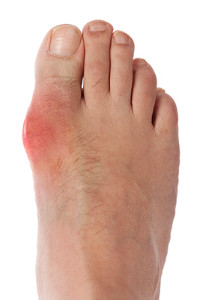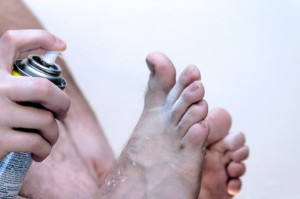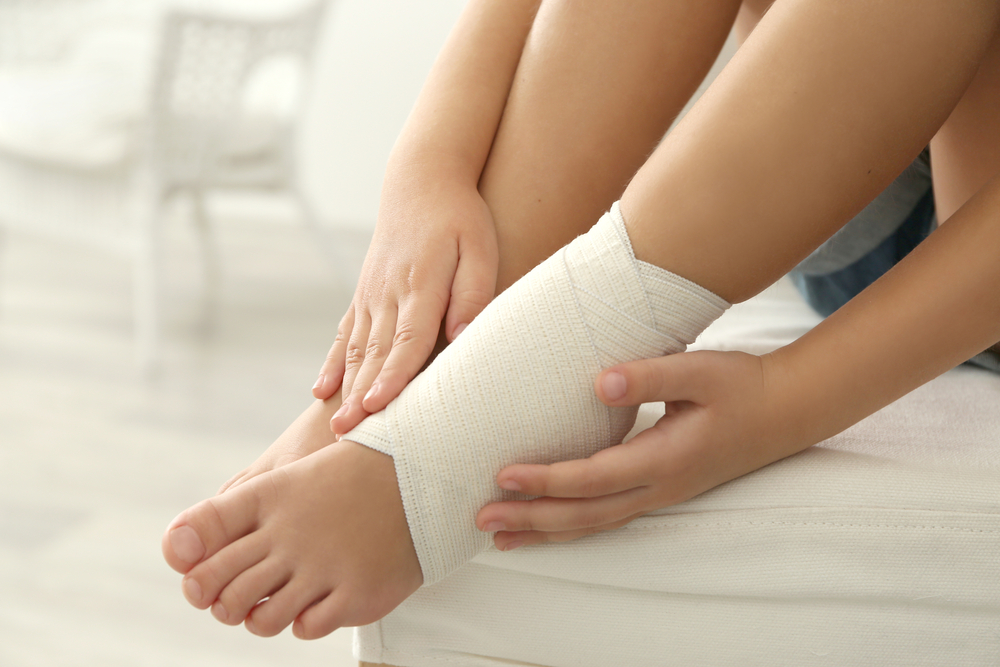Freehold (732) 294-9393
Freehold (732) 294-9393
 Some of the symptoms that accompany the type of arthritis referred to as gout may be pain and stiffness in the joints of the big toe and surrounding areas. The main cause of this condition originates from excess uric acid that accumulates in the blood stream. Research has shown that many gout attacks occur without warning and often while sleeping, and typically affects the bottom of the big toe. There are several types of food that may cause this ailment, including red meat, certain kinds of seafood, in addition to ingesting an overabundance of alcohol, which may play a significant role in developing gout. Some people may be more susceptible to developing gout, and these may include having a genetic disposition, specific medications, and being overweight. Preventative remedies may include drinking plenty of fresh water daily in addition to adapting healthy lifestyle changes. If you are affected with gout, it’s suggested to consult with a podiatrist to learn about proper treatment options.
Some of the symptoms that accompany the type of arthritis referred to as gout may be pain and stiffness in the joints of the big toe and surrounding areas. The main cause of this condition originates from excess uric acid that accumulates in the blood stream. Research has shown that many gout attacks occur without warning and often while sleeping, and typically affects the bottom of the big toe. There are several types of food that may cause this ailment, including red meat, certain kinds of seafood, in addition to ingesting an overabundance of alcohol, which may play a significant role in developing gout. Some people may be more susceptible to developing gout, and these may include having a genetic disposition, specific medications, and being overweight. Preventative remedies may include drinking plenty of fresh water daily in addition to adapting healthy lifestyle changes. If you are affected with gout, it’s suggested to consult with a podiatrist to learn about proper treatment options.
Gout is a painful condition that can be treated. If you are seeking treatment, contact Dr. Henry Miller from New Jersey. Our doctor will treat your foot and ankle needs.
What Is Gout?
Gout is a form of arthritis that is characterized by sudden, severe attacks of pain, redness, and tenderness in the joints. The condition usually affects the joint at the base of the big toe. A gout attack can occur at any random time, such as the middle of the night while you are asleep.
Symptoms
Risk Factors
Prior to visiting your podiatrist to receive treatment for gout, there are a few things you should do beforehand. If you have gout you should write down your symptoms--including when they started and how often you experience them, important medical information you may have, and any questions you may have. Writing down these three things will help your podiatrist in assessing your specific situation so that he or she may provide the best route of treatment for you.
If you have any questions, please feel free to contact our office located in Freehold, NJ . We offer the newest diagnostic and treatment technologies for all your foot care needs.
Read more about Gout Pregnant women tend to experience many different foot problems during their pregnancy. One of these problematic conditions is edema. Edema is a condition that is characterized by an excess of watery fluid that collects in the body’s cavities and tissues. Some pregnant women notice that their shoe size will also become larger as a result of their swollen feet. Approximately 75% of pregnant women deal with edema before they reach their third trimester. Although the condition can be frustrating, it is usually harmless. If you are trying to minimize edema, you should drink a lot of water, eat a well-balanced diet, and avoid sitting or standing for long periods of time. If you have questions or concerns regarding your feet during pregnancy, consult with your podiatrist.
Pregnant women tend to experience many different foot problems during their pregnancy. One of these problematic conditions is edema. Edema is a condition that is characterized by an excess of watery fluid that collects in the body’s cavities and tissues. Some pregnant women notice that their shoe size will also become larger as a result of their swollen feet. Approximately 75% of pregnant women deal with edema before they reach their third trimester. Although the condition can be frustrating, it is usually harmless. If you are trying to minimize edema, you should drink a lot of water, eat a well-balanced diet, and avoid sitting or standing for long periods of time. If you have questions or concerns regarding your feet during pregnancy, consult with your podiatrist.
Pregnant women with swollen feet can be treated with a variety of different methods that are readily available. For more information about other cures for swollen feet during pregnancy, consult with Dr. Henry Miller from New Jersey. Our doctor will attend to all of your foot and ankle needs.
What Foot Problems Can Arise During Pregnancy?
One problem that can occur is overpronation, which occurs when the arch of the foot flattens and tends to roll inward. This can cause pain and discomfort in your heels while you’re walking or even just standing up, trying to support your baby.
Another problem is edema, or swelling in the extremities. This often affects the feet during pregnancy but tends to occur in the later stages.
How Can I Keep My Feet Healthy During Pregnancy?
If you have any questions please feel free to contact our office located in Freehold, NJ . We offer the newest diagnostic and treatment technologies for all your foot and ankle needs.
 Athlete’s foot, also known as tinea pedis, is a common fungal infection that can affect people who work out at public gyms. You can develop this condition by wearing tight, sweaty shoes for a long period of time or by walking barefoot on damp surfaces around your gym. This fungal infection is typically described as being itchy and scaly, and it can actually spread to other parts of the body. If you are looking for ways to avoid getting athlete’s foot, you should avoid walking barefoot at the gym, and opt to wear flip-flops instead. However, if you do get athlete’s foot, you may be able to treat it with over-the-counter fungal cream. If the cream doesn’t work for you, you may want to see your podiatrist to find a treatment option for your specific case.
Athlete’s foot, also known as tinea pedis, is a common fungal infection that can affect people who work out at public gyms. You can develop this condition by wearing tight, sweaty shoes for a long period of time or by walking barefoot on damp surfaces around your gym. This fungal infection is typically described as being itchy and scaly, and it can actually spread to other parts of the body. If you are looking for ways to avoid getting athlete’s foot, you should avoid walking barefoot at the gym, and opt to wear flip-flops instead. However, if you do get athlete’s foot, you may be able to treat it with over-the-counter fungal cream. If the cream doesn’t work for you, you may want to see your podiatrist to find a treatment option for your specific case.
Athlete’s Foot
Athlete’s foot is often an uncomfortable condition to experience. Thankfully, podiatrists specialize in treating athlete’s foot and offer the best treatment options. If you have any questions about athlete’s foot, consult with Dr. Henry Miller from New Jersey. Our doctor will assess your condition and provide you with quality treatment.
What Is Athlete’s Foot?
Tinea pedis, more commonly known as athlete’s foot, is a non-serious and common fungal infection of the foot. Athlete’s foot is contagious and can be contracted by touching someone who has it or infected surfaces. The most common places contaminated by it are public showers, locker rooms, and swimming pools. Once contracted, it grows on feet that are left inside moist, dark, and warm shoes and socks.
Prevention
The most effective ways to prevent athlete’s foot include:
Symptoms
Athlete’s foot initially occurs as a rash between the toes. However, if left undiagnosed, it can spread to the sides and bottom of the feet, toenails, and if touched by hand, the hands themselves. Symptoms include:
Diagnosis and Treatment
Diagnosis is quick and easy. Skin samples will be taken and either viewed under a microscope or sent to a lab for testing. Sometimes, a podiatrist can diagnose it based on simply looking at it. Once confirmed, treatment options include oral and topical antifungal medications.
If you have any questions, please feel free to contact our office located in Freehold, NJ . We offer the newest diagnostic and treatment technologies for all your foot care needs.
 One of the most common injuries the feet can endure may be an ankle sprain. Although this may be a common occurrence among athletes, many people will experience this condition as a result of everyday activities. It happens when the ankle twists unnaturally, and the ligaments and tendons in the foot endure enormous stress. There are several symptoms that are indicative of a sprained ankle including severe pain and discomfort, swelling, and bruising. Some of the more typical reasons why an individual may sprain their ankle may include stepping off a curb that was out of sight, or stepping down with excessive pressure while running. If you feel you have injured your ankle that may have resulted in a sprain, please schedule a consultation with a podiatrist for proper treatment.
One of the most common injuries the feet can endure may be an ankle sprain. Although this may be a common occurrence among athletes, many people will experience this condition as a result of everyday activities. It happens when the ankle twists unnaturally, and the ligaments and tendons in the foot endure enormous stress. There are several symptoms that are indicative of a sprained ankle including severe pain and discomfort, swelling, and bruising. Some of the more typical reasons why an individual may sprain their ankle may include stepping off a curb that was out of sight, or stepping down with excessive pressure while running. If you feel you have injured your ankle that may have resulted in a sprain, please schedule a consultation with a podiatrist for proper treatment.
Ankle sprains are common but need immediate attention. If you need your feet checked, contact Dr. Henry Miller from New Jersey. Our doctor can provide the care you need to keep you pain-free and on your feet.
How Does an Ankle Sprain Occur?
Ankle sprains take place when the ligaments in your ankle are torn or stretched beyond their limits. There are multiple ways that the ankle can become injured, including twisting or rolling over onto your ankle, putting undue stress on it, or causing trauma to the ankle itself.
What Are the Symptoms?
Preventing a Sprain
Treatment of a Sprain
Treatment of a sprain depends on the severity. Many times, people are told to rest and remain off their feet completely, while others are given an air cast. If the sprain is very severe, surgery may be required.
If you have suffered an ankle sprain previously, you may want to consider additional support such as a brace and regular exercises to strengthen the ankle.
If you have any questions please feel free to contact our office located in Freehold, NJ . We offer the newest diagnostic and treatment technologies for all your foot and ankle needs.